Private CT Scans | No NHS referral needed | Immediate access to a CT scan with an expert radiologist’s report
Zak Master, Pall Mall Radiographer
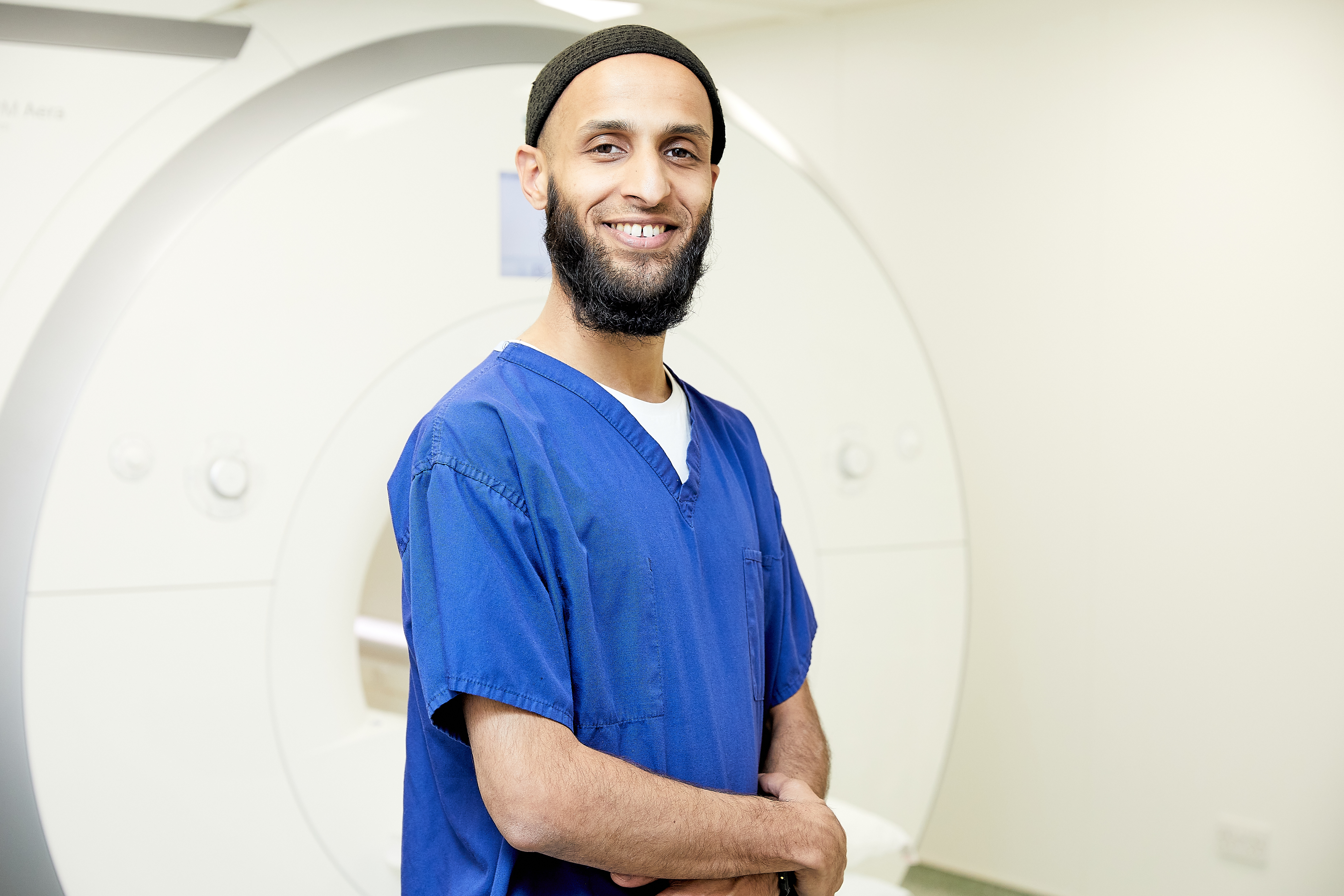
Private CT Scans
- No waiting times
- Fast results
- No NHS referral
- Price from £430
Zak, Pall Mall Radiographer
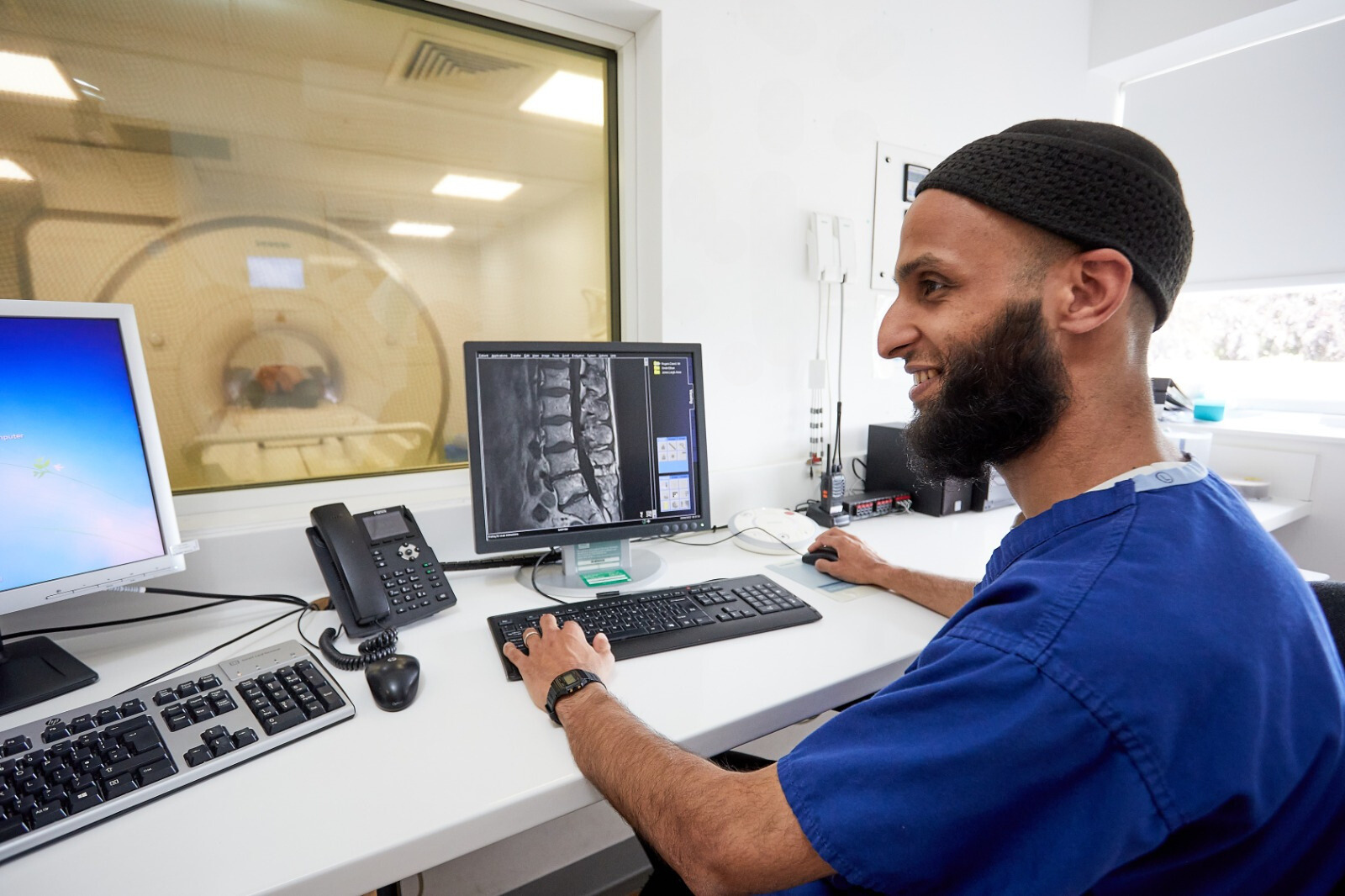
Worried about your sports injury? Ease your mind and muscles with a CT scan at Pall Mall

Enquire About Our Services
A member of our team will be in touch with you to discuss your requirements.
Pall Mall, Newton-Le-Willows
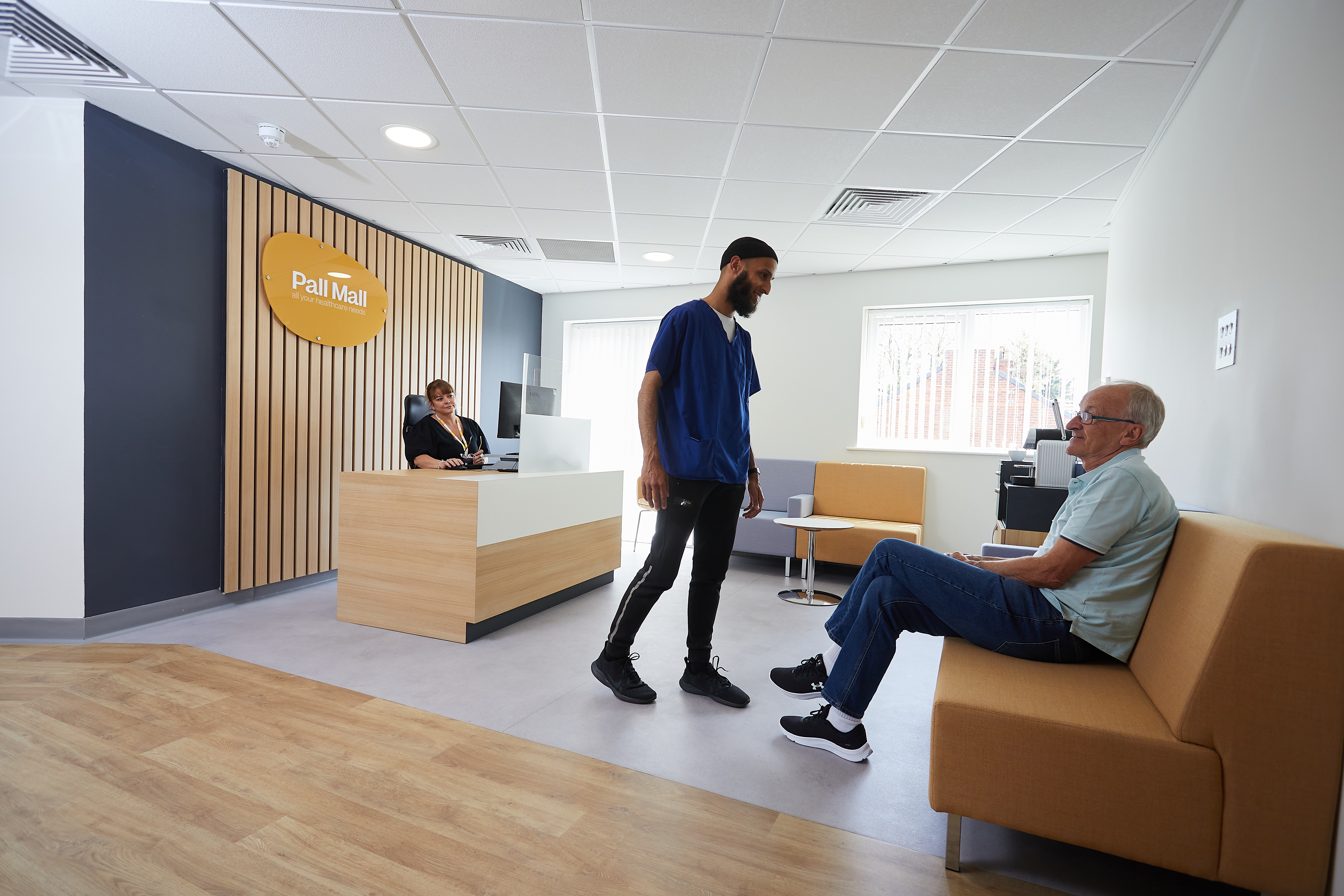
Going private with Pall Mall
There are many reasons why people might start considering going private, especially when it comes to CT Scans. From long waiting lists and limited appointment times on the NHS, we understand the frustration that comes when you’re waiting on results - or simply waiting to be seen.
Those in need of urgent medical care can access our CT Scan services quickly, providing prompt support after consultation or for those who wish to be seen quickly without a referral.
Accessing the care you need couldn’t be simpler with Pall Mall.
Being a patient with us gives you unrivalled access to our own private hospital, based in Newton-le-Willows, so you can get the treatment you need with no fuss, no waiting, and no complications. Our hospital offers comprehensive care and high-end technology for you.
But we know that life goes on. That's why our highly-trained professionals have a wide selection of appointments available throughout the day, including after work hours, so your health can always come first, no matter the schedule.
CT Scan, Pall Mall
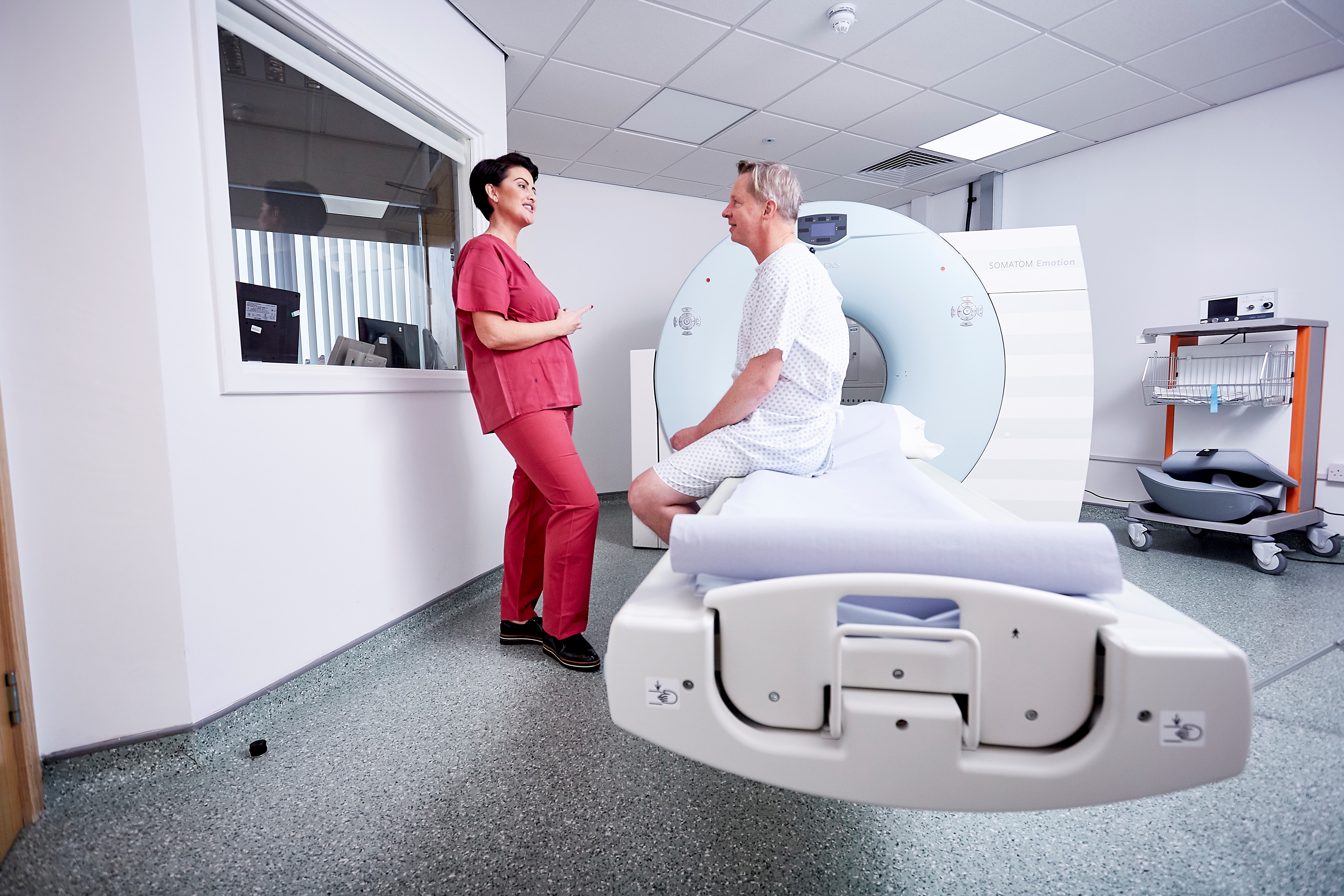
What is a CT scan?
CT Scans are a painless, non-invasive, and accurate form of diagnostic imaging, used to provide highly detailed information about what's going on inside your body.
This allows our experts to take a clear look at what's going on internally, even revealing anatomic details of vital organs that are not possible to see from a flat, single image.
As such, we can also use this kind of medical imagery to help 'screen' individuals who are at a heightened risk of certain medical conditions, like heart disease, internal bleeding or colon cancer.
How does a CT scan work?
CT scans employ the same type of radiation used for x-rays but provide a more accurate three-dimensional image.
Unlike conventional X-rays, which take two-dimensional images to show structures inside the body such as bones, CT scans offer a clearer view of inner organs, blood vessels, and soft tissues than their traditional counterparts.
These appear as cross-sectional images, which are produced during the scan.
During a CT scan, a patient lies on a table, which slides into a large tube - which looks a little like a donut or a large polo mint!
This tube contains an x-ray machine that takes photos of the inside of the body, during a short, painless process that usually takes no more than 15 minutes.
The pictures taken during the scan then get sent to a computer, where a radiographer assembles the photos to create a 3D image.
These are then passed on to the radiologist who will produce an in-depth report on the findings.
Depending on the situation, it's also possible for a physician to evaluate the images separately.
The benefits of a CT Scan with Pall Mall
Pall Mall Medical provides medical tests, scans, diagnostics, and imaging for various specialist areas to help diagnose and manage a range of physical symptoms. It can also offer screenings for peace of mind in relation to any medical condition such as cancer.
Our private doctors and consultants have access to various scanning techniques, with results typically provided within 7-10 working days.
Our clinicians have extensive experience and can provide a diagnosis quickly, before moving forward to set up suitable treatment plans that pivot with you.
When are CT Scans used?
CT Scans can not only be used to help diagnose a number of conditions but can also help guide further tests and treatments and keep a close eye on existing medical situations.
This ranges from identifying issues such as damage to internal organs and bones, blood flow problems such as blood clots and stroke, and diagnosing cancer.
From this, doctors can identify the shape, size and location of cancers before going on to have radiotherapy. We are also able to perform further checks - such as a needle biopsy - or monitor tumours throughout treatment.
CT scans can be utilised by medical professionals for prior surgical preparation or as a navigational tool during biopsies.
Our diagnostic imaging technology is of the highest quality, capable of imaging muscular and nervous systems.
As such, brain scans and broken bones can all be identified using our services - spot-checking immediate injury or helping dictate treatment for ongoing worries.
Thanks to the expert reporting provided by CT Scans, our images can help you diagnose, confirm or investigate a problem further - which can all be presented to your consultant.
Get in touch with our friendly team today to find out whether a CT Scan will be able to shed further light on your health.
CT Scanner, Pall Mall
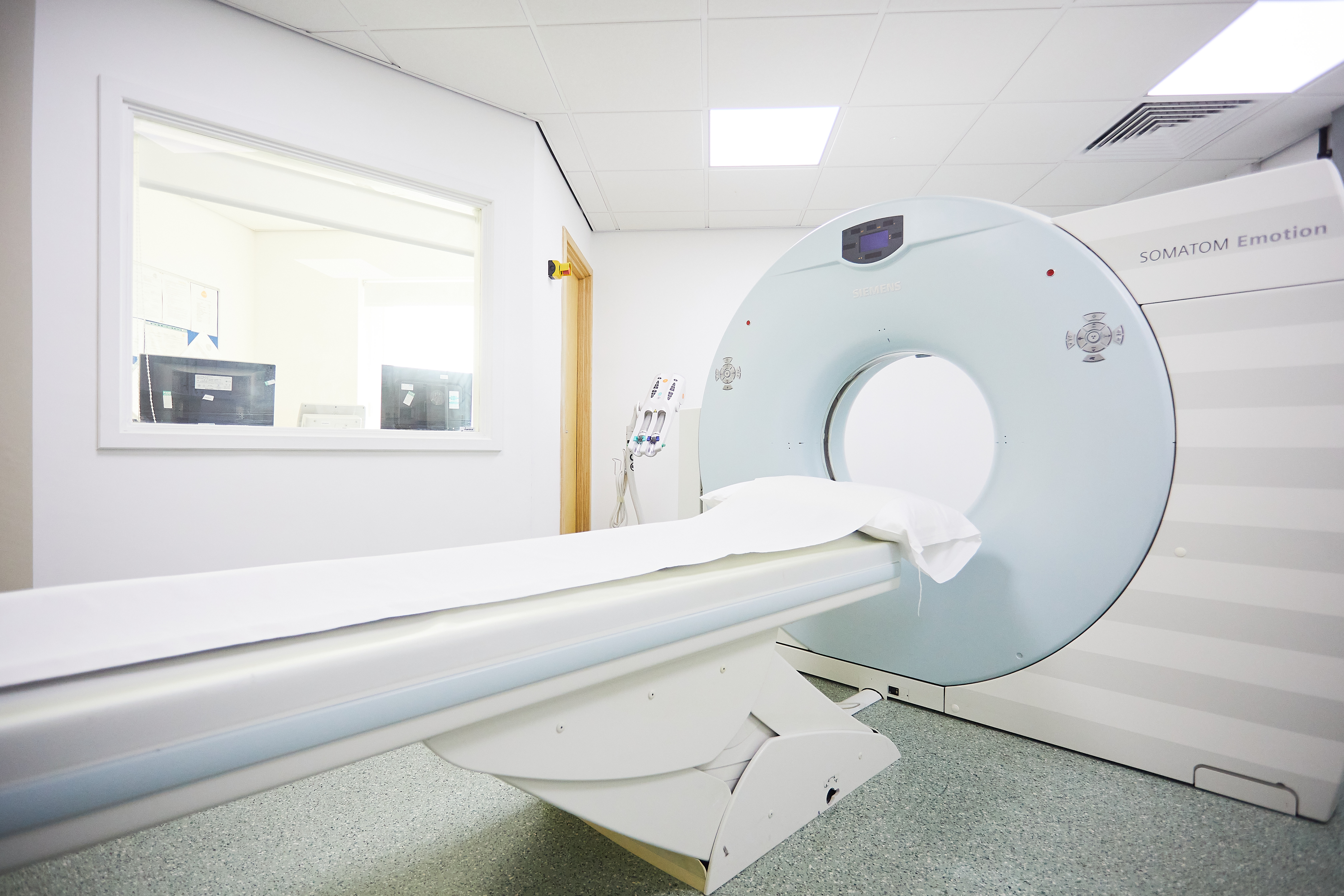
What to expect from a Private CT Scan with Pall Mall
We know that any medical procedure can feel a little daunting - especially if you've never had a private CT Scan before.
But don't worry, as the team from Pall Mall are on hand from the moment you book your scan, when you receive your results, and beyond.
Whenever a CT scan is necessary, it is best to have it done in a timely manner. Even if you're planning on self-referring for an issue you'd like to get to the bottom of, we know that further delays for weeks or months can cause stress that you, and your family, simply don't need.
As you'll likely already know, on the NHS, a referral for a CT scan by a doctor can often lead to these long waiting times.
At Pall Mall, a private CT scan at our CQC-registered hospital can be arranged quickly and easily without a referral or delay - whether you need it to examine a medical condition, treat an unresolved sports injury, or simply check your overall health.
Diagnosis and treatment can be done quickly and easily with this technique, making it one of the most popular services we offer.
Bev, Pall Mall Imaging Co-ordinator
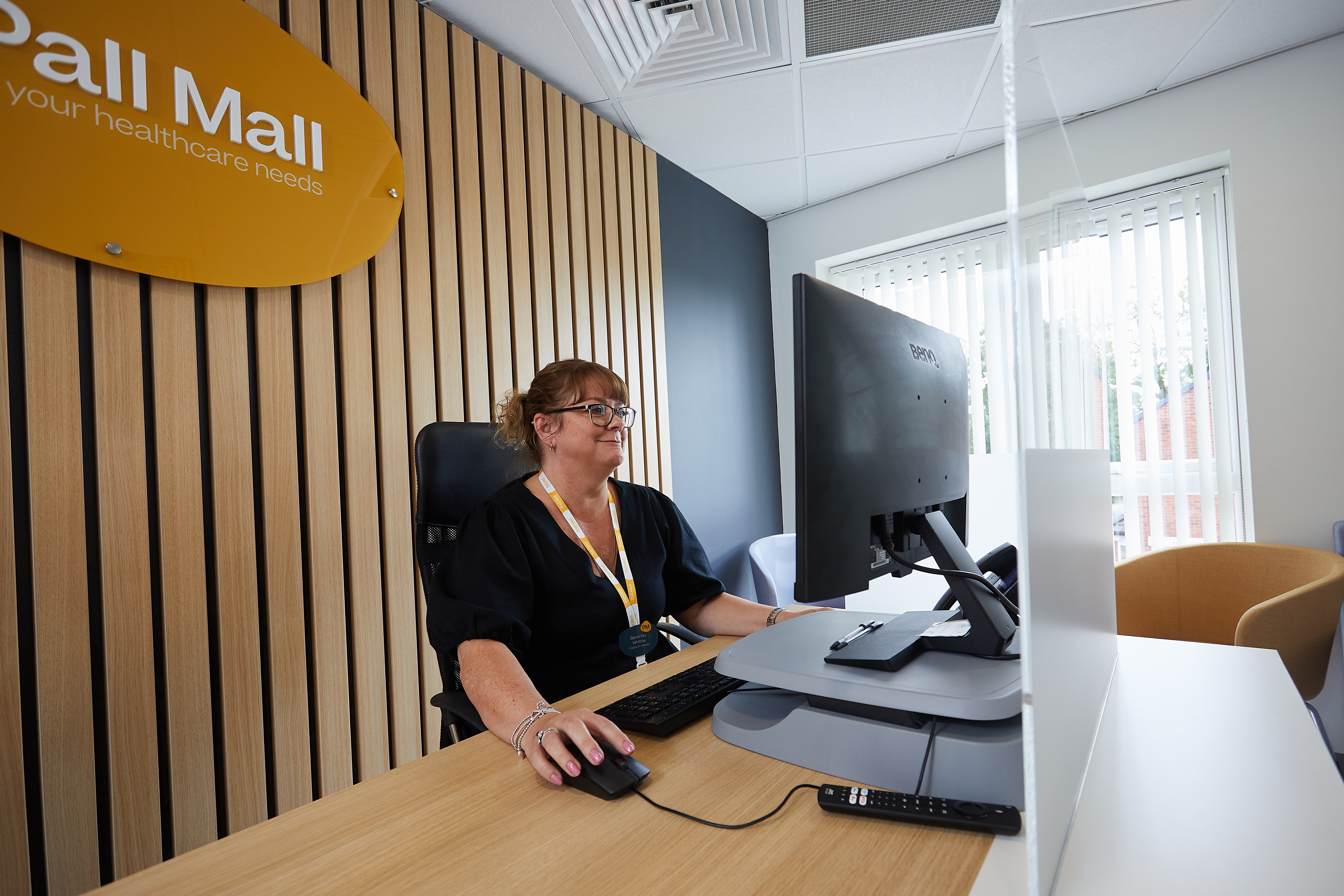
Looking to get started? It couldn't be easier with Pall Mall
When you need to get to the bottom of a condition, we're here to give you immediate access to a private CT scan with an expert radiologist’s report - with no wait and no fuss.
At Pall Mall, you can simply book a computerised tomography scan without getting a referral from your NHS doctor.
All it takes is a straightforward phone call with a member of our booking team to get things started, where we'll offer you a range of appointment slots to ensure you get the care you need at your own speed.
The longest wait you can expect for an appointment with us is two or three days, with same-day appointments all available at our own CQC registered private hospital in well-connected Newton-le-Willows.
We're proud to operate on a patient-first approach, with our family-led practice providing industry-leading medical care to people and their families across the North West - and beyond.
So whatever your condition or concern, we have the medical expertise and advice you need, exactly where - and when - you need it.
To book your private CT Scan, give our friendly team a call today.

What to expect from a Private CT Scan
Although a CT Scan might be a nerve-wracking procedure, it's actually very straightforward, safe, and completely painless.
Unlike an MRI scan, the scanner doesn't surround your whole body at once, so you shouldn't feel trapped or claustrophobic - but we know that everyone has their own thoughts and feelings ahead of a medical imaging procedure.
If you still have some concerns ahead of your private scan, just let a member of Pall Mall's staff know.
We're here to make sure your experience goes as smoothly as possible - especially if you need a reassuring hand and an expert voice to put those worries to rest.
As such, a CT Scan is an effective way to gain valuable insights into what's going on inside the body, giving you the 'bigger picture' when it comes to your health and wellbeing.

Who can't have CT Imaging?
In some cases, there are people who won't be able to have a CT scan.
This usually comes down to metals, as the scanner can impact them during the course of treatment - whether that's implanted metals such as screws or plates, or even piercings.
Before your scan, it's crucial that you notify the radiographer if you have had previous surgery that placed metals inside your body.
Piercings
You will also be asked to remove any metal jewellery or piercings before entering the scanner, as these will be visible on the test results. This can be a problem when the jewellery obscures the area of concern, which is why we will usually ask you to remove it where possible.
If you have a piercing that is difficult to remove or that is causing you concern ahead of your appointment, make sure to let your radiographer know beforehand.
However, when asked to take off any metal jewellery, you can ask about the possibility of a nonmetallic replacement.
These usually come in two forms:
- Hypoallergenic and lightweight 'Bioflex'
- Bodysafe glass - which is often used in 'plugs' and other stretched piercings
Make sure to get your retainer well before your procedure and check with your doctor if possible. This is to avoid any disappointments that may come with rescheduling or even cancelling your procedure.
If you need assistance with insertion and jewellery removal, coordinate with your piercer ahead of time.
Pregnancy
If you are pregnant or think that you may be expecting, then you should let the staff at Pall Mall know as soon as possible.
This is because CT Scans aren't usually recommended for pregnant people unless it's an emergency or in very serious circumstances.
This is due to the potential risk that the X-rays and very mild exposure to radiation could harm the baby.
However, that doesn't mean that there are no further options. If you're pregnant, an ultrasound might be recommended over a CT Scan - so you can still receive care and medical imaging in line with your needs.
Other health conditions
Before undergoing a private CT Scan, make sure you talk to your doctor about all your health conditions before the test.
We'll ask you some general questions, before giving you the opportunity to tell us if you:
- Are allergic to any medicines.
- Have diabetes.
- Take metformin.
- Are breastfeeding.
If you get nervous or panicked in confined spaces, we can help.
Just let us know, as we may be able to prescribe you some medicine to help you relax throughout the procedure.

Private CT Scan medical insurance
When it comes to covering your private CT Scan, know that we collaborate with all of the main private health insurance companies - so you have peace of mind moving forward with your health care.
This means you may be able to cover the cost of your procedure with your health insurance plan, which can provide peace of mind when it comes to getting much-needed treatment.
However, prior to scheduling an appointment with the team at Pall Mall, you should always call your insurance provider to check whether a private CT Scan falls within your policy.
Your insurance company will also confirm if this service is covered, and they can pre-approve your care.
Once this is approved and you're all set, be sure to let us know your pre-authorisation code and insurer information ahead of your booking.
David, Pall Mall Medical Patient

What should you do before undergoing CT Imaging?
There aren’t any special preparations you especially need to make on the day of your scan.
Simply arrive at our private hospital in Newton-le-Willows a little ahead of your planned appointment time and a friendly member of our team will direct you to the right place - and we'll sort the rest.
Apart from remembering not to wear any metal, or having switched out any piercings for appropriate retainers, wearing loose and comfortable clothing might be a good idea.
Before you step into the scanning suite, you'll be asked to do the following:
- Take off any jewellery or metallic accessories, such as a watch.
- You will then remove all - or most - of your clothing and change into a medical gown.
- However, depending on the area being scanned, you may be able to leave some clothes on - so make sure you take everything out of your pockets before entering the scanner.
- To help improve image quality, you may have something called contrast material (a medical dye) put into your arm through a tube called an IV.
Once these are all boxed off, you can then carry on with the procedure.
Using 'Contrast Material' for Medical Imaging
For some CT scans, a special dye called contrast material is required to help highlight the areas of your body that are being looked at by your radiographer.
Contrast material blocks X-rays and shows up white on images, which 'light up' blood vessels, intestines, or other structures - giving us a better understanding of where issues might lie.
Contrast material might be given to you:
- By injection: The most common method of administering contrast agents, a nurse or assistant can inject it using a thin, flexible plastic tube called an IV. A device is inserted into a vein in the arm to enhance the clarity of imaging for the gallbladder, urinary tract, liver or blood vessels.
- By mouth: Contrast material may be administered orally if imaging of the oesophagus or stomach is required.
- By enema: A contrast material may be inserted in your rectum to help radiographers fully visualise your intestines. As with other procedures, such as colonoscopies, this might make you feel a little uncomfortable or 'bloated', but it soon passes.
With most contrast materials administered by injection, you might feel a quick sting or pinching sensation when the IV is started.
The dye may make you feel warm and flushed and give you a metallic taste in your mouth. Some people feel sick to their stomach or get a headache. Tell the radiologist or your doctor how you are feeling during the scan but don't worry, this will usually fade once the substance has passed out of your system.
When breastfeeding, it is advised to consult a doctor if you have any concerns regarding the safety of dye usage in tests.
Generally, experts believe that minimal amounts of dye pass into breast milk and therefore even less reaches the baby - but if you prefer, you can store some of your breast milk ahead of time and use it for a day or two after the test.
What happens during the scan?
Once you're all prepped, have changed into a hospital gown (depending on which area is set to be scanned), and are relaxed, you'll then be taken to the CT scanning room.
Here, patients are usually asked to lie on their backs on a flatbed.
The CT scanner consists of a ring that will rotate around a small section of your body as you progress through it. Here, the best thing to do is simply lie back and relax, as any movement will affect the quality of your results.
The radiographer will operate the scanner from the next room. While the scan is taking place, you'll be able to hear and speak to them through an intercom, so they'll be able to give you instructions and regularly check in with you throughout.
The scan will usually take around 10 to 20 minutes, making it one of the quickest and easiest procedures around when it comes to diagnostics and treatments.
When the scan is taking place, please remain motionless and maintain your normal breathing - this is to make sure your images are as clear as possible and there is no blurring.
You may also be asked to breathe in, breathe out, or hold your breath at certain points by the radiographer.
Inside the machine
When the preparations are complete, the bed moves a few millimetres incrementally in order to complete the scan. Unlike an MRI scanner, a CT Scan doesn't surround your whole body at once, so you won’t feel enclosed or claustrophobic - it simply consists of a ring that rotates around a small section of your body as you pass through it.
The radiographer will then leave the room and speak to you through an intercom system, letting you know what’s happening throughout the duration of the scan. Before it begins, the machine will be positioned around the area of your body which needs investigating, so depending on the type of scan, you'll be told how to dress appropriately ahead of time.
Once you're in, the scans only last a few minutes. The radiographer will let you know when you can get dressed and start to move.
Steven, Pall Mall Medical Patient

What happens afterward?
Generally, it only takes a few minutes to complete a CT scan, but you may have to stay around a bit afterward.
Although your time in the scanning suite will be relatively brief, you could be needed at the hospital for approx 30-60 minutes in total. This is to make sure you're safe to go home, as your healthcare team will be keen to check that everything has gone smoothly and you're feeling fit before heading back. For example, when you receive a contrast medium from a radiographer, you must wait to make sure you haven't reacted.
If you're feeling well following your scan, you can simply continue with your daily activities, such as driving and returning to work or back home if you choose to.
After your private CT scan at Pall Mall, you'll receive a full report from your expert radiologist explaining the results and whether any further tests or consultations are required.
CT scan results are considered to be normal if the radiologist doesn’t discover anything abnormal in the images.
But if anything is spotted, we'll arrange a consultation to discuss our findings, any concerns and how we'll move forward to help your health - together.
Safety of CT scans
One of the biggest and most frequent questions we get asked at Pall Mall is, "how safe are CT scans?"
Luckily, the answer is quite simple.
Our private CT scans are an incredibly safe procedure - and although you will have some mild X-Ray radiation exposure - the diagnostic benefits can out way this risk.
In fact, it is one of the most straightforward and simple procedures when it comes to getting to the root of a problem, but we understand that it can cause some worry.
Although it can sound a little daunting, the average radiation dose you can expect is a actually similar amount to what you would receive from roughly 3 years of natural exposure from our everyday environments.
As such, private CT scans with Pall Mall are quick, painless, and generally safe.
Mild risks
But as with any medical procedure, there are small risks involved. These may be:
- You could have an allergic reaction to the contrast dye used
- Increased risk to developing babies if pregnant (which is why we advise against CT Scans for expecting women)
- Mild exposure to ionising radiation
During CT scans, radiation exposure may increase your chances of developing cancer many years later - but this risk is extremely small (less than 1 in 2,000) because the radiation doses are very low.
It's important to note that the amount of radiation you're exposed to during a CT scan can vary, depending on how much of your body is scanned.
But don't worry, as most scanners are designed to make sure you're not exposed to unnecessarily high levels.
At Pall Mall, we put your health first
The benefits and risks of having a CT scan will always be weighed up before it's recommended to you.Even if you are self-referring, our team will make sure to let you know of all the risks and give you as much information as possible so you can come to an informed decision.
But if you still have concerns, or have any issues you'd like to raise, talk to your dedicated Pall Mall doctor or radiographer before your scan.
We'll be able to put your mind at rest. Put you, and your health, first by getting in touch with us today for a straightforward and stress-free chat.
Pall Mall Manchester
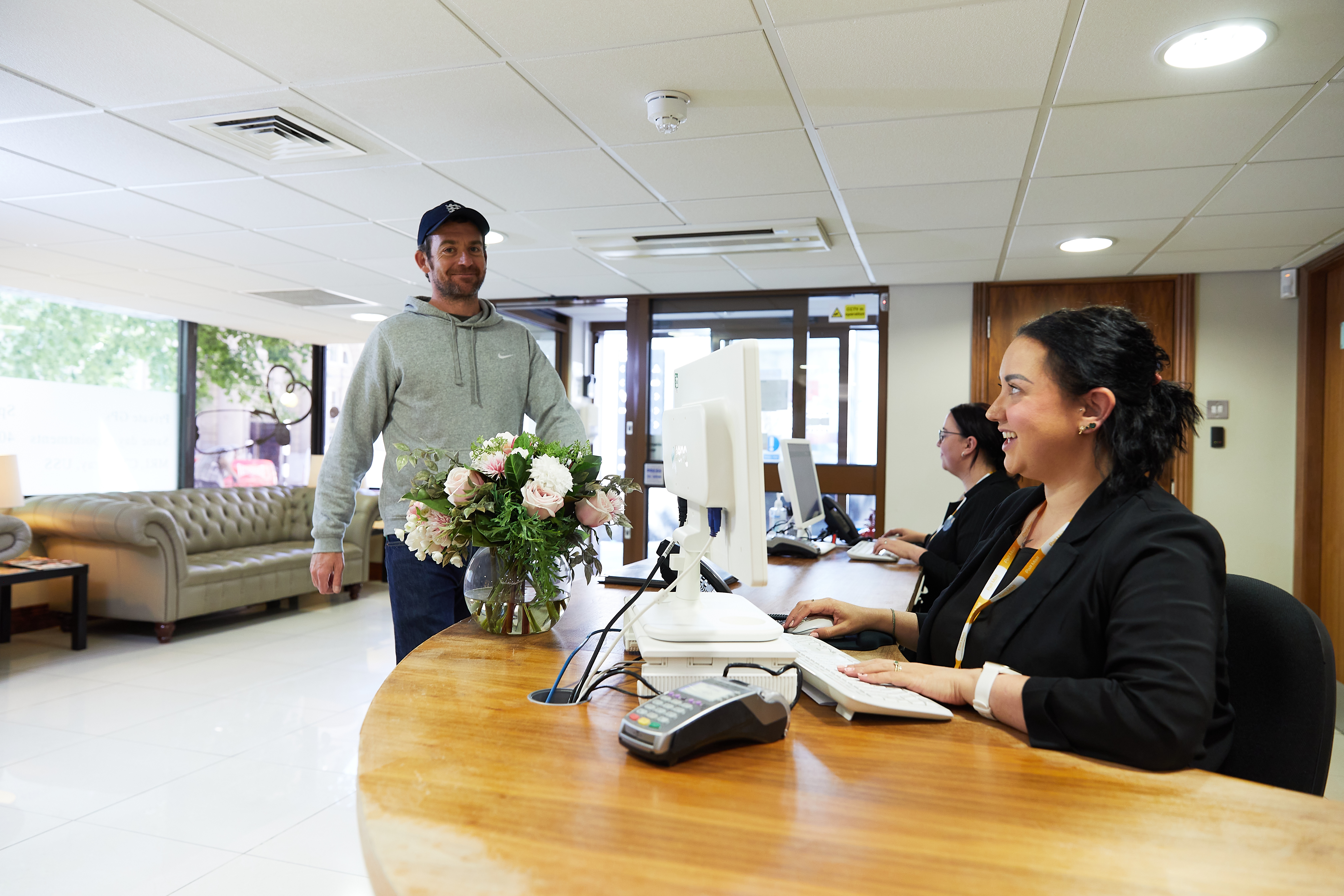
Booking a CT scan at Pall Mall
With super-fast results, cutting-edge equipment, and expert radiologists' reports, all from as little as £395, getting a private CT Scan with Pall Mall couldn't be easier.
Pall Mall offers CT scans without a referral from your doctor. Same-day appointments are also attainable, with the longest wait for appointments usually taking only two to three days from when you first call to book with us.
Whether you've been referred by your NHS GP or are planning on referring yourself, getting the care and attention you need is simple and straightforward with our leading private services.
Referrals
If you have a referral form or letter from your doctor, we can book your private imaging scan once our radiographers have reviewed and confirmed your document. Unlike NHS scans, our private facilities and capabilities mean you skip the long waiting list, getting seen as soon as possible.
Don't delay - book your referral with us today.
Non-referrals
If there's something weighing on your mind that you think a CT scan can help with, you don't need a referral from your NHS GP to use our self-referral options.
At Pall Mall, we provide a complimentary consultation with our own private Doctor, who will gather the clinical information the radiographer needs ahead of your scan. From existing health problems to issues you're keen to address, we can plan a course of action based on your unique needs.
With no lengthy waiting lists or queues, we can immediately schedule you for your a quick and easy scan after one of our dedicated team members has created and reviewed your referral.
Are you a referring GP, consultant, or physician?
If you are a GP, we know that you need a simple and straightforward way to refer patients when it comes to a leading CAT Scan service.
That's why we offer a one-page referral template (available here) which you can download and return to us via email (gp@pallmallmedical.co.uk) or fax.
Alternatively, you can send us your own imaging referral form or a clinic letter, which we will use to collate information and will get in touch with the patient to book their private scan on your behalf.
Once the patient has undergone their procedure, one of our radiographers will send you a copy of the report when the results are ready.
We can also deliver photographs to the patient via CD or send them to you via IEP, so everyone is equipped with the right information and feels confident to move forward with a treatment plan if needed.
CT Scanner Pall Mall Medical
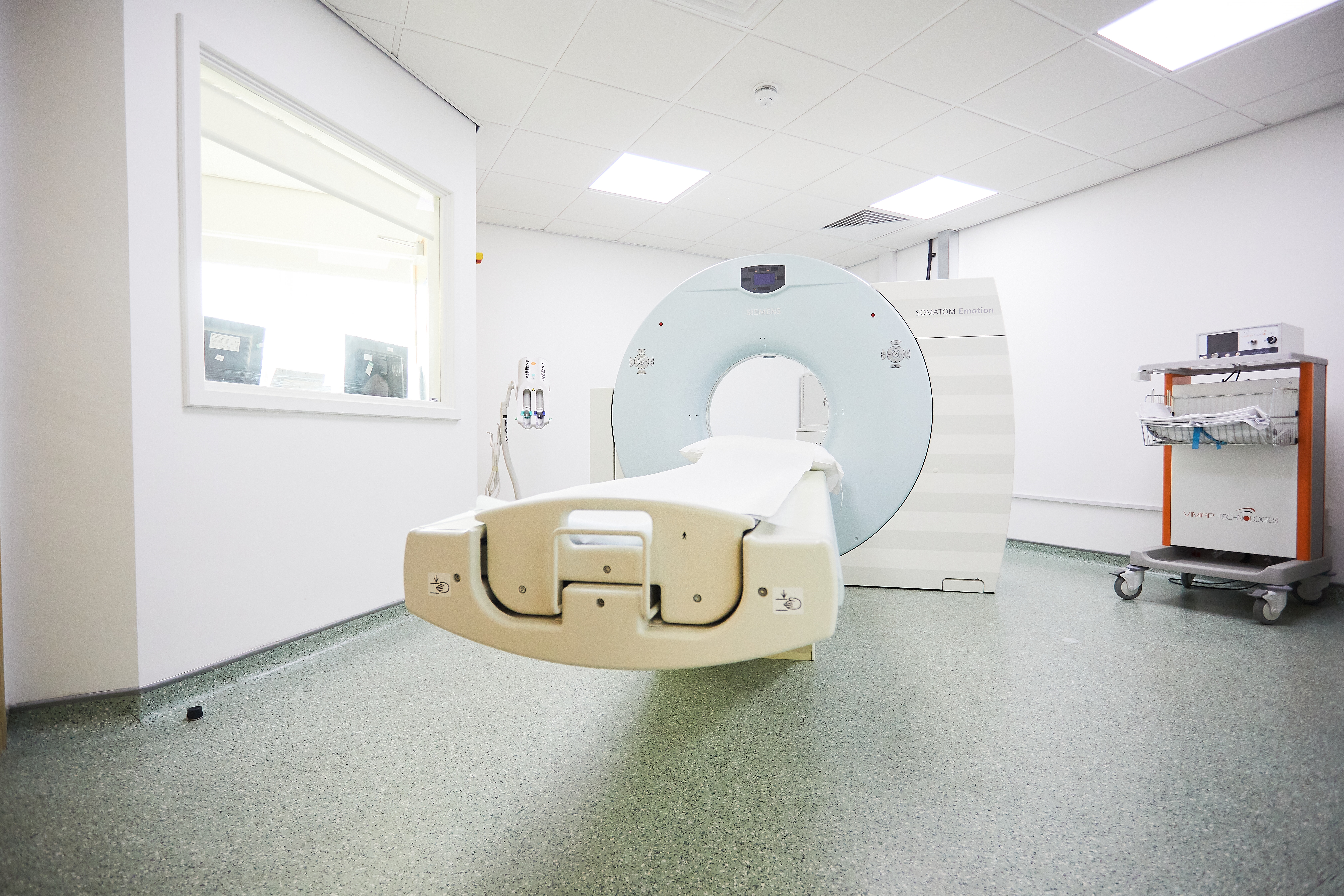
Which issues can a CT scan identify?
A CT scan is used to detect or monitor many health conditions including:
- broken bones, osteopathic issues, and other problems that impact your bones
- tumours, concerning lumps and cancers
- internal damage caused by infection, inflammation and other factors.
- evaluate conditions related to the heart and blood vessels, using CT angiography as an imaging technique
- assess digestive issues affecting the stomach and intestines, using a CT Scan of the large bowel, which is also known as virtual colonoscopy
- diagnose issues related to kidneys, urinary system or bladder through the use of tomography pyelography, or urography
CT scans can generate comprehensive imaging of the interior of the body, which includes organs, arteries, and bones.
Most areas of the body can be seen during a CT scan including bones and joints, internal organs, soft tissue and the brain. Examining these areas can provide experts with data to support the diagnosis and monitoring of various conditions, such as inflammation, disease, and cancer.
Pall Mall Medical
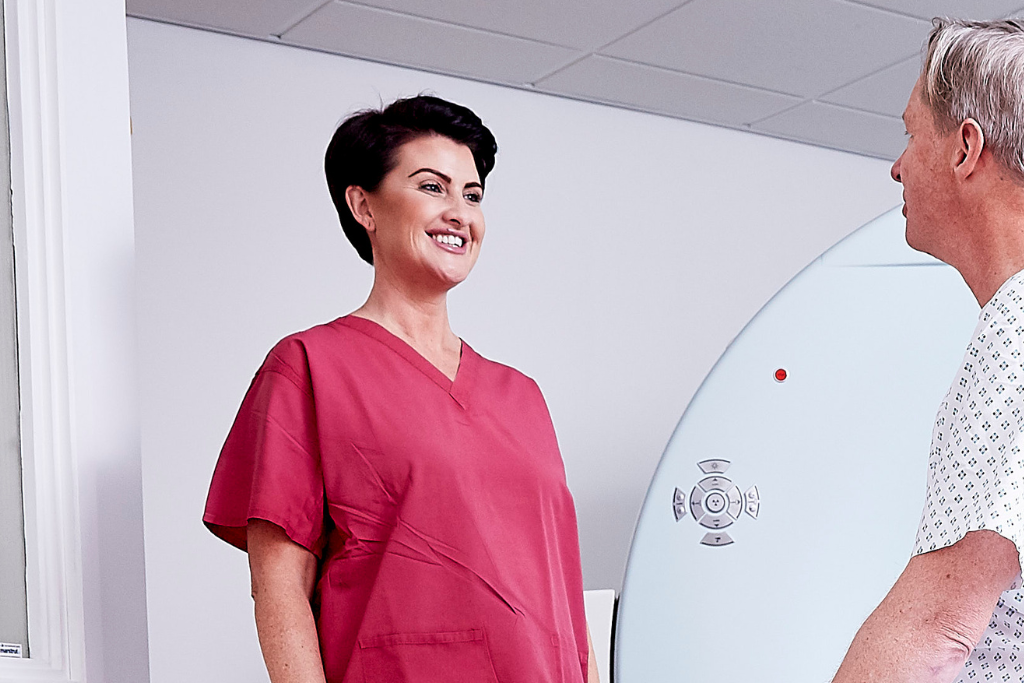
Whereabouts can a Private CT Scan be used?
A private CT scan can be used across multiple body parts for a variety of purposes.
Vital Organs
Internal organs such as the heart, lungs, liver, intestine, and kidneys can be examined to diagnose a variety of conditions including pneumonia, blood clots and renal cysts.
Soft Tissue
The scan can detect components such as tendons, fibrous tissue, fat, ligaments, and organs for issues like cancerous growths, tendon and ligament injuries, and ruptured blood vessels.
Head/Brain
Potential life-threatening conditions that can be diagnosed and identified include bleeding, infection, blood clots, and the possibility of a brain tumour. We can also use CT Scans to get to the bottom of visual issues, nerve damage, and more.
Blood and Bone Density
Medical diagnostics for problems concerning blood vessels and bone diseases including osteoporosis can be provided.
Virtual Colonoscopy
A virtual colonoscopy is an option that can be used instead of an invasive, surgical colonoscopy, offering enhanced detection of bowel cancer and other issues such as tumours and polyps.
CT Scan, Pall Mall
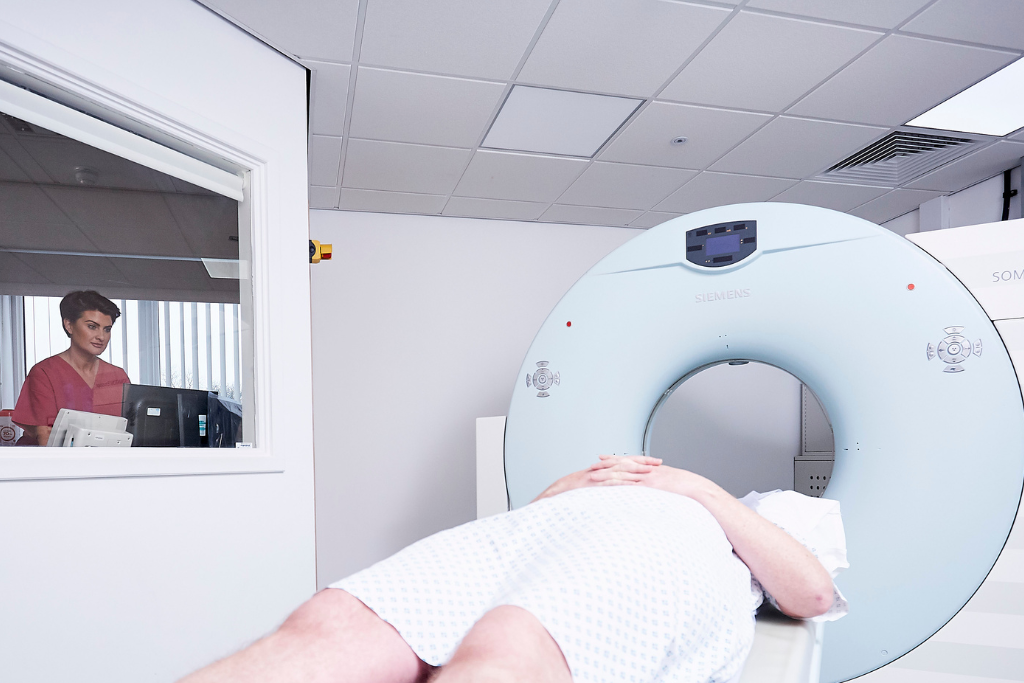
A note on pelvis and abdominal scans
People who are larger in size may not be able to pass through the traditional CT scanner opening, as the usual maximum weight capacity of the movable table is typically 450 pounds.
If you're concerned, make sure to talk to your doctor ahead of your procedure so we can ensure the best course of action for your needs.
Possible switches to conventional x-rays
In other diagnostic situations, such as gallstones, an abdominal CT scanning may not be able to detect them with the same sensitivity as an abdominal ultrasound. Your doctor will decide which method will work best for the desired results.
In cases of acute abdominal conditions in infants such as vomiting or the presence of blood in stool, doctors also tend to favour alternative imaging techniques like plain films, gastrointestinal (GI) contrast exams, and ultrasound.
Finally, in certain circumstances, MRI evaluation and diagnosis may be advantageous compared to CT scanning for liver, kidney, pancreatic, uterine, or ovarian abnormalities.
As always, your Pall Mall radiographer and doctor will make choices based on your unique anatomy and circumstances, to determine the best way forward.
CT Scan, Pall Mall Medical
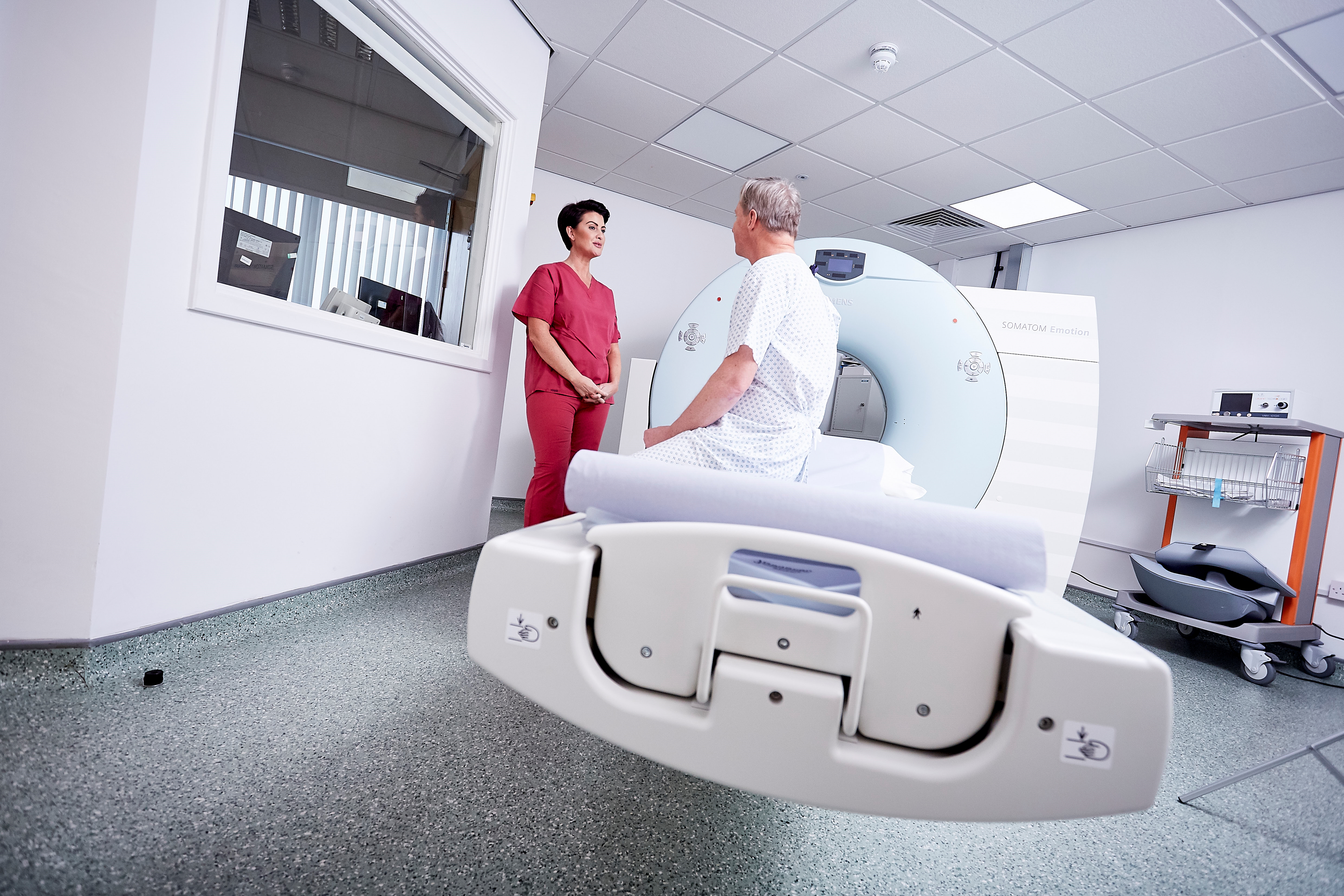
Thinking of a Private CT Scan? Here are the most common issues we see.
Whether you've been feeling under the weather or want to keep tabs on a pre-existing condition, a private CT Scan with Pall Mall can give you clear and concise answers - without the long wait.
Our team of radiographers and private doctors are on hand to provide top-quality care, using state-of-the-art medical imaging equipment to get to the bottom of a myriad of issues.
In this section, we'll look at some of the most common procedures our CT Scan is capable of, giving you a little more insight into how our private service could benefit you and your family.
Examining Blood Vessels
CT scans provide a detailed examination of blood vessels, enabling physicians to detect and identify blockages or other issues. If you already have existing problems or health concerns, we can also confirm or reinforce the diagnosis of vascular disease without having to perform invasive exploratory surgery or surgical biopsies.
As such, a CT Scan prevents further stress and strain on the body - while providing sharp and granular imaging of blood vessels.
Diagnosing Abdominal Issues
Abdominal CT scans may utilise barium as a contrast dye to create detailed images of organs such as the liver, kidneys, gallbladder, spleen, ovaries and the uterus.
Some of the most common reasons you might seek a CT Scan include the following symptoms:
- A mass in your abdomen
- Abdominal pain
- Unexplained weight loss
- Possible obstructions in the small or large intestine
- Possible inflammation in the intestines
- Kidney stones
With computerised tomography - also known as CT urography, which evaluates the kidneys, bladder, and ureters - these problems can be identified, forming the foundation of an effective treatment plan if needed.
Examining Small Bones
When it comes to the arms, hands and feet, the bones can be remarkably small and difficult to see on traditional X-rays. As such, injuries in these areas may be difficult to spot from x-rays alone - which is where a CT scan can come in handy.
This method can provide physicians and doctors with incredibly clear images that may assist in surgical repairs.
Investigating Tumours
A CT scan is usually the first stage in the process when someone needs surgery to remove a tumour.
This is because a surgeon can carry out procedures like biopsies and removals much more quickly, confidently and effectively when they have as much knowledge as possible about the tumour's location and size.
Essentially, CT scans help doctors and surgeons assess the extent that a tumour has invaded surrounding tissue, which can enhance surgical outcomes and improve the effectiveness of additional treatment.
Guiding Cancer Treatment
CT scans are often crucial when it comes to cancer diagnostics and forming an ongoing treatment plan, creating a reliable framework that can be referred to - and relied on - by multiple doctors.
This can also provide further clarity when radiation treatment is administered, as CT scans are used to clarify the position of tumours to boost accuracy and ensure the right areas are being targeted.
Medical professionals also utilise CT scans to evaluate the effectiveness of chemotherapy, since the images provide clear margins regarding cancer progression and speed.
Examining Head and Brain Injuries or Issues
A CT scan of the head provides clear images of the brain that can be used to evaluate, identify and diagnose a number of issues.
Some of these include:
- Traumatic head injuries
- Headaches of varying intensity and longevity
- Experiencing dizziness persistently
- The presence of bleeding
- Evidence, or likelihood, of stroke
- Brain tumours
Although less common, a head CT scan can also help with :
- Assessing soft tissue and bone damage resulting from facial trauma.
- Developing a plan for surgical reconstruction.
- Assessing issues related to the temporal bone in the skull that can lead to hearing difficulties.
- Detecting inflammation in the sinuses.
- Positioning and guiding the needle for a brain biopsy.
- Identify and evaluate aneurysms.
Diagnosing Soft Tissue Damage
X-rays are less effective at displaying soft tissue structures - which is where CT Scans can play a pivotal role.
The dual advantage of CT scans is that they can provide physicians with comprehensive information regarding bone and soft tissue conditions, which can aid in diagnosis and treatment planning.
Diagnosing Spinal Issues and Chronic Pain
A CT scan of the spine may be ordered if a person is experiencing chronic back pain or has sustained an injury to their spine. Additionally, a doctor may also use a spinal CT scan for further diagnostics, or to do the following:
- Analysing spinal fractures.
- Evaluate the state of the spine before and after surgical procedures.
- Diagnosing the source of spinal pain caused by conditions such as herniated disks.
- Assessing bone density can help to determine the risk of fractures for individuals with high levels of osteoporosis.
- Assessing congenital abnormalities and diagnosing scoliosis.
In these particular cases, CT scans are also useful when used alongside magnetic resonance imaging (MRI) scans.
This is especially prevalent for patients experiencing the narrowing of the spinal canal, infections, or arthritis.
Investigating Recent Injuries or Accidents
Whether you're experiencing pain following a fall or want a closer look at an area that may have underlying problems after an accident, any activity that resulted in possible severe internal injuries are great candidates for a CT scan.
For emergency assessment of potential internal injuries, CT scans are usually the preferred imaging procedure and typically yield more information than X-rays alone.
Common accidents include motor vehicle accidents or other traumatic events, which are excellent recommendations for the quick and effective service Pall Mall's private CT Scans can offer.
Obtaining Images When MRI Is Not an Option
MRI and CAT scans are both used to obtain and examine diagnostic imaging.
While an MRI may not always be appropriate, a CT scan is usually a suitable option for a range of people and their symptoms.
Additionally, MRI scans can take much longer to complete when compared to CT scans, particularly if the patient cannot remain still for the necessary duration or experience anxiety or claustrophobia in enclosed spaces.

Is a CT scan painful?
If you, or a family member, are set to undergo a CT Scan - it's understandable that you'd feel a little nervous ahead of the procedure.
But other than these nerves, the test will not cause you any pain. This is because a CT scan is a non-invasive procedure that is relatively short compared to other imaging methods.
As such, it is over very quickly and you can go back to your daily activities in as little as an hour - with our friendly and dedicated team on hand from the moment you arrive at our private hospital to the second you leave with your results.
If you're still nervous, we can administer a special medicine to help you relax (a sedative) - which is administered through an IV in a similar fashion to contrast material.
As always, if you're feeling sick, woozy, or overly anxious, make sure to tell a member of the team so we can help - or stop the test, if needed.

MRI vs CT Scan
Although both devices are used to help doctors and radiologists get a clear view of what's going on inside your body, both an MRI and a CT Scan use different techniques and approaches when it comes to medical imagery.
How does a CT scan work?
A CT scan utilises X-rays to make detailed pictures of organs, bones, and other tissues. During a scan, the person lies on a table which passes through a doughnut-like scanning ring. The data from this is then used to generate 3D images, which can reveal issues or provide diagnostics such as tumours in different organs, blockages in blood vessels, pneumonia in the lungs or even bone fractures.
What does an MRI show?
A powerful magnet and radio waves are used to create detailed pictures of areas inside the body using MRI. Additionally, these images can demonstrate the differences between normal and diseased tissue. However, people who are nervous or struggle with claustrophobia might find an MRI scan difficult. That’s because the doughnut-shaped device used to scan your body is much thicker, forming an enclosed space.
We put you at the heart of everything we do

We put the patient at the heart of everything we do.
Pall Mall is cosmetic surgery care owned and led by doctors –which means care without compromise. We’re driven by how best we can deliver what will make you feel great about yourself – from your first call right through to total, attentive aftercare.
- Care Quality Commission Regulated.
- State-of-the-art facilities.
- No waiting lists.
- Rated 4.95 by our patients.
- No referrals required.
Why Choose Pall Mall?
As a proudly independent and Doctor-led private healthcare provider, we offer our patients quick and reliable service exactly when they need it. Throughout their journey with us, our goal is to help patients from up and down the country live longer, healthier, happier lives - a journey that starts with us.
That’s why our clinics have no waiting lists and we can usually book you in for a same-day appointment, with consultations and treatments designed to fit around you. We’re also open late nights and at weekends, so you can book an appointment at a time that suits you and your loved ones.
Pall Mall provides more than 70 medical services, with a variety of financing options. In this way, the cost can be spread out over several months or even several years if necessary - so worrying about cost doesn’t have to come at your health’s expense.
Our CQC registered clinics are located in Liverpool, Manchester city centre, and Newton-le-Willows in the North West, which is home to our privately-owned hospital.
Here, you’ll find our industry-leading scanning suites, which can help you establish a problem, find out what’s causing issues and get you on the road to recovery.
To book your private CT Scan with us today, give our friendly team a call.
Always here to help, whenever you need us
Our expert team are always here to help, advise and arrange appointments with our specialist consultants.

